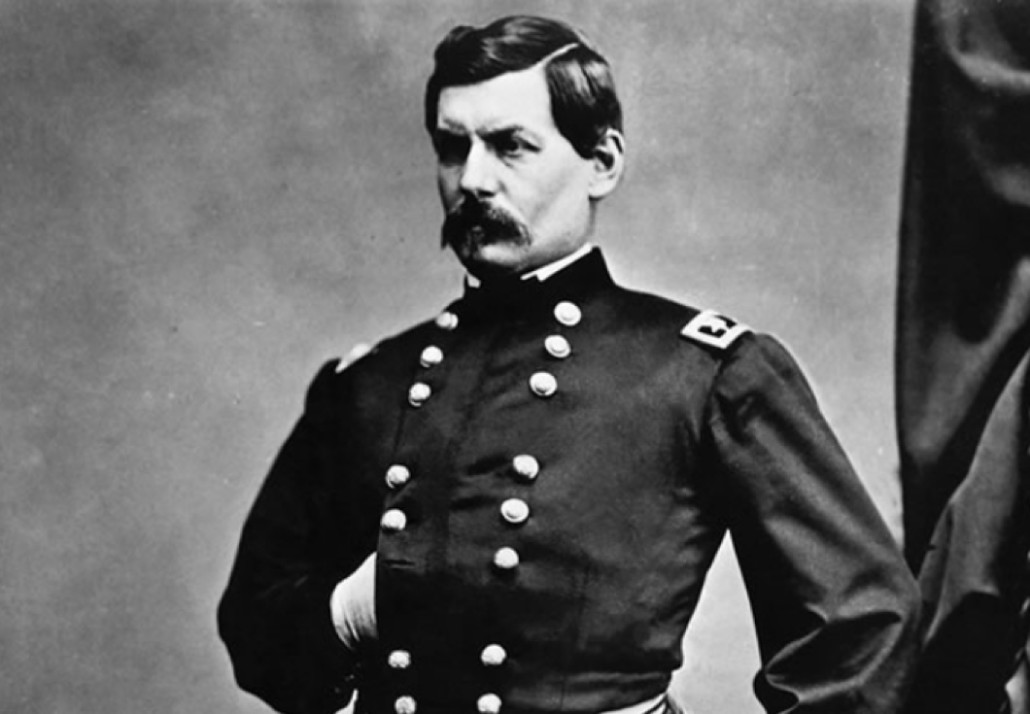You can never predict where research will lead you when writing an historical novel. One fact I could not avoid when doing research for “The Designated Virgin” was the deep political divides that existed at the time of the Civil War. At least one prominent Northern general thought Abraham Lincoln was a fool and that the issue of slavery was not worth shedding blood over.

Major General George B. McClellan had urged President Lincoln to seek a compromise with the Southern states that would permit some slave ownership to continue.
It didn’t help that the two men were from different ends of the political spectrum. Abraham Lincoln was a Republican who had vowed during his run-up to the presidency that he would not foist his abolitionist beliefs on the nation. McClellan, a staunch Democrat, felt personally affronted when Lincoln responded to the secessionist assault on Fort Sumter by declaring war.
Lincoln was a unifier by temperament, so it was partly a gesture of conciliation when he elevated George McClellan to the top army post of chief of the Army of the Potomac, the main Union army in the East.
But McClellan remained belligerent and openly voiced disdain toward his commander-in-chief and the political administration in Washington, D.C. McClellan’s wife was caught writing that Lincoln was “nothing more than a well-meaning baboon” and that Secretary of State William Seward was an “incompetent lap puppy.”
One cool November night in 1861 Abraham Lincoln stopped by McClellan’s home accompanied by William Seward and presidential secretary John Hay. The visitors were told that McClellan had stepped out, and the three said they would wait. McClellan returned within an hour and when he was told that Lincoln and the others were in the drawing room he went straight to his bedroom. Lincoln waited another half hour before a porter informed them that McClellan had retired for the night.
John Hay took offense but Lincoln shrugged it off saying, “Better at this time not to be making points of etiquette and personal dignity.”
McClellan’s avoidance of confrontations extended to the advancing Confederate army. It is then that Lincoln famously mocked him, saying “If the general does not want to use the army, I would like to borrow it for a time.” Shortly after, Lincoln removed him from command.
All of this is part of the baggage brought forth to a 1909 meeting in “The Designated Virgin.” Film director D.W. Griffith, himself a son of a Confederate colonel, seeks an emergency meeting with New York City Mayor George B. McClellan Jr., son of the famous Union general. Mayor McClellan has been a political force in New York’s Tammany Hall since 1892. Most recently he ordered closed all the nickelodeons in Manhattan.
In my novel, the fate of the Biograph Company rests in the mayor’s hands, and Griffith, a lifelong admirer of Abraham Lincoln, prepares himself for a battle:
Their fathers were mortal enemies, though never on the same battlefield. By now the name of Major General George McClellan had risen from the ranks of history to command a nearly mythic post.
McClellan! How many times had he heard his father say the name? On occasions when he honored visitors with his account of the war, the old colonel would slow when he got to that name, savoring the juicy repetition of those double L’s. It was like giving his own private tongue-lashing to the butcher of Antietam. …
Both of their fathers had tasted disaster at the end of the Civil War. Maybe he could use that to establish a bond between them. Old General McClellan, of course, had built a new career for himself in European diplomatic circles and had gone on to being elected governor of New Jersey. But old Colonel Jacob Griffith was not so lucky. He never got over the defeat of the South, and spent the rest of his days nursing his wounds with his porch hounds and whiskey bottles.
Those old soldiers had passed away long ago now. But they could still prove useful. It was a long shot, and Griffith knew he was being naïve to even think it, but wouldn’t it be too perfect if their own grown sons could rise together out of the shadows of history? Wouldn’t it be delicious if their ancient divisions could become his ace in the hole?
(© 2019 John W. Harding)
For more information on “The Designated Virgin: A Novel of the Movies,” visit the book’s Web site.


Leave a Reply